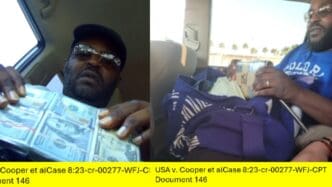KEY POINTS
- Virgil Cooper and Angelo Jordan were sentenced to lengthy federal prison terms for their roles in a cocaine trafficking conspiracy.
- The drug trafficking plot was initiated by Cooper while in prison, who sought to establish a direct cocaine supply line from Colombia.
- The arrests were the result of a DEA sting operation that involved undercover agents and a confidential source.
Two Ohio men have been sentenced to lengthy federal prison terms in Tampa for their roles in a large-scale cocaine trafficking conspiracy that originated from a federal prison connection. U.S. District Judge William F. Jung sentenced Virgil Cooper, 42, to 19 years and 7 months, and his co-conspirator, Angelo Jordan, 49, to 15 years and 8 months. The sentences, delivered on August 8, 2025, followed a four-day trial in May where a federal jury found both men guilty of attempting to purchase and distribute more than five kilograms of cocaine in an elaborate Drug Enforcement Administration (DEA) sting operation.
The ambitious plot was masterminded by Cooper while he was still serving a sentence for a prior felony. According to trial evidence, Cooper contacted a former cellmate who had been deported to Colombia, seeking to establish a direct supply line for cocaine at a discounted rate, thereby cutting out domestic middlemen. This initial outreach set in motion the very investigation that would lead to his downfall.
The former cellmate, in a critical turn of events, connected Cooper with an individual who was, in fact, a confidential source working with the DEA. This connection allowed federal agents to orchestrate a sophisticated undercover operation, posing as large-scale narcotics suppliers with direct access to Colombian cocaine.
The Undercover Operation
The DEA arranged an initial meeting in Tampa in February 2023 to showcase the supposed product to the prospective buyers. Undercover officers prepared to display 10 kilograms of cocaine to demonstrate their credibility as suppliers. At the time, Cooper was still confined to a halfway house and could not travel, so he dispatched Jordan to act on his behalf.

Demonstrating the seriousness of their intent, Jordan drove approximately 17 hours from Ohio to Tampa to inspect the narcotics. This meeting solidified the connection between the Ohio-based conspirators and the undercover agents, paving the way for a much larger transaction.

The Final Transaction and Arrest
Following Cooper’s release from the halfway house, communications with the undercover agents intensified as they negotiated a significantly larger deal. The conspirators agreed to purchase an initial shipment of 30 kilograms of cocaine. On August 3, 2023, Cooper and Jordan traveled together from Cleveland to Tampa to finalize the deal.
They arrived at the pre-arranged location with a down payment of $120,000 in cash. Immediately after they delivered the money to the undercover officers, law enforcement teams moved in and arrested both men without incident, bringing the operation to a successful close.
Legal Proceedings and Federal Response
A federal jury found Cooper and Jordan guilty on May 1, 2025, on charges of conspiring to distribute and possess with the intent to distribute five kilograms or more of cocaine, as well as attempting to possess with the intent to distribute the same amount. The case was prosecuted by Special Assistant United States Attorney David Rehfuss and Assistant United States Attorney E. Jackson Boggs, Jr.
The investigation was a collaborative effort led by the DEA with significant assistance from the Tampa Police Department. It was conducted under the umbrella of the Organized Crime Drug Enforcement Task Force (OCDETF), a cornerstone of the Department of Justice’s strategy against major criminal networks.
The Organized Crime Drug Enforcement Task Force (OCDETF) Program
The OCDETF program is an intelligence-driven, multi-agency initiative designed to identify, disrupt, and dismantle the most serious drug trafficking, weapons trafficking, and money laundering organizations. It combines the resources and expertise of federal, state, and local law enforcement agencies to combat transnational criminal enterprises.
By leveraging the capabilities of agencies like the DEA, FBI, ATF, and Homeland Security Investigations, OCDETF investigations target the entire command and control structure of these networks. This case serves as a textbook example of the program’s effectiveness, utilizing confidential sources and complex undercover operations to neutralize a trafficking cell before it could distribute a significant quantity of dangerous narcotics into American communities.
In conclusion, the substantial prison sentences for Virgil Cooper and Angelo Jordan underscore the federal government’s commitment to prosecuting high-level drug traffickers. The successful sting operation not only prevented a large shipment of cocaine from reaching the streets but also dismantled a conspiracy that sought to establish a direct pipeline from a foreign source country, highlighting the crucial role of multi-agency task forces in safeguarding public safety.








